1-neuropsychology: Stress resistance, Measured by the Stroop test (See Wikipedia page)
“Stroop Color Word test” is a test used by large companies and military, it quantifies the ability to withstand stress due to the interference of various information that involve the factors of speed, vigilance and concentration.
|
Experimental Conditions |
Parameter studied |
Before protection |
After protection |
Authors |
|
Test duration 119 Workers on screen (France) + 308 in Japan |
“Stroop Color Word Test“= Standard value of the measurement: |
Measure = 0.94 Resistance is less |
Measure = 1.07 + 14.9 % Improvement with CMO |
J-L. Marande CHU Hospital Cochin (Paris) |
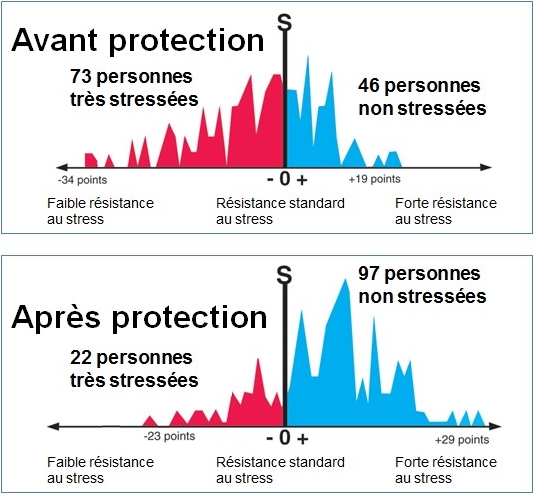
Screen workers protected by CMO statistically improve their average stress resistance by 15% compared to the period without CMO, indicating that the electromagnetic field of the computer screen is stressful, that it decreases the performance of work; That on the other hand the results of each individual can be altered by a magnetic oscillator compensating these effects of electromagnetic source stress.
2-neuropsychology: Motivation-Serenity
MOTIVATION = Spirit + enthusiasm + alertness-apathy-drowsiness-numbness
SERENITY = Calm + relax + relaxation + tranquility-Malaise-agitation-twitching-anxiety
Professor A. Canavan, Neuropsychiatrist, (University of Luton, UK) evaluated the psychological and emotional state of 100 students from his university (double blind) by the mood test.
On the one hand, the increase in the motivation of the students was expressed by a difference of 48% between the students with placebo and those protected with CMO.
On the other hand, the increase in serenity was measured by a difference of 46.8% between students with placebos (unprotected) and students protected.
An increasing serenity of 46.8% and an increased motivation of 48% thanks to a biologically compatible electromagnetic environment.
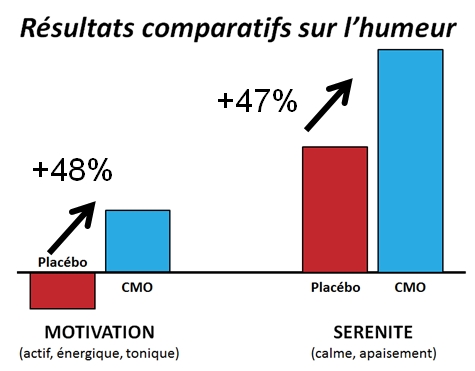
3-Symptoms of chronic stress (See Wikipedia page)
Neuropsychical disorders: fatigue, weariness; headaches, headaches; Concentration irritable, tense; depressed, pessimistic; Short-term memory loss.
Functional disorders: Dry, itchy or tired eyes; coughing, sneezing; clogged or flowing nose; dry, thirsty throat; Cold, flu; sore throat; redness or itching.
Pain, stiffness: Stiff neck pain; shoulders pains; Lumbar region pains; Hand pain wrists or fingers; breathing difficulties; Stiff pain or discomfort in: arms and elbows.
|
Experimental Conditions |
Parameter studied |
Before protection |
After protection |
Authors |
|
Test duration 965 people |
“Building Sickness Syndrome”: |
Average = 6,6 Symptoms
|
Average =4.4 Symptoms 33 % |
Prof. Clements-Croome Reading University, UK |
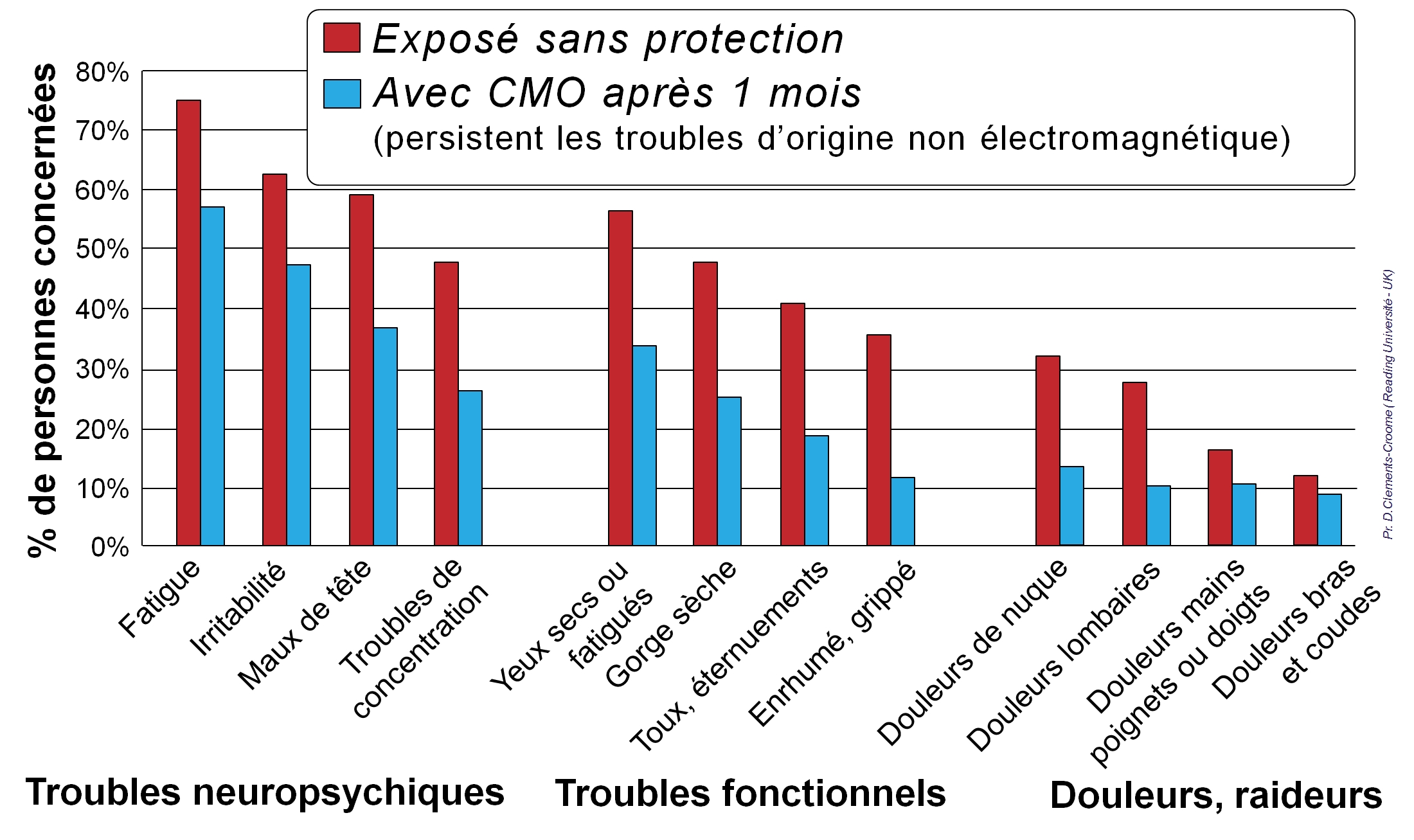
|
Experimental Conditions |
Parameter studied |
Before protection |
After protection |
Authors |
|
Test duration 12 Topics 1 to 3h/day |
Chronic stress Symptoms
|
Average = 10 Symptoms
|
Average =4.9 Symptoms 51% Missing symptoms |
Prof. Clements-Croome Reading University, UK |
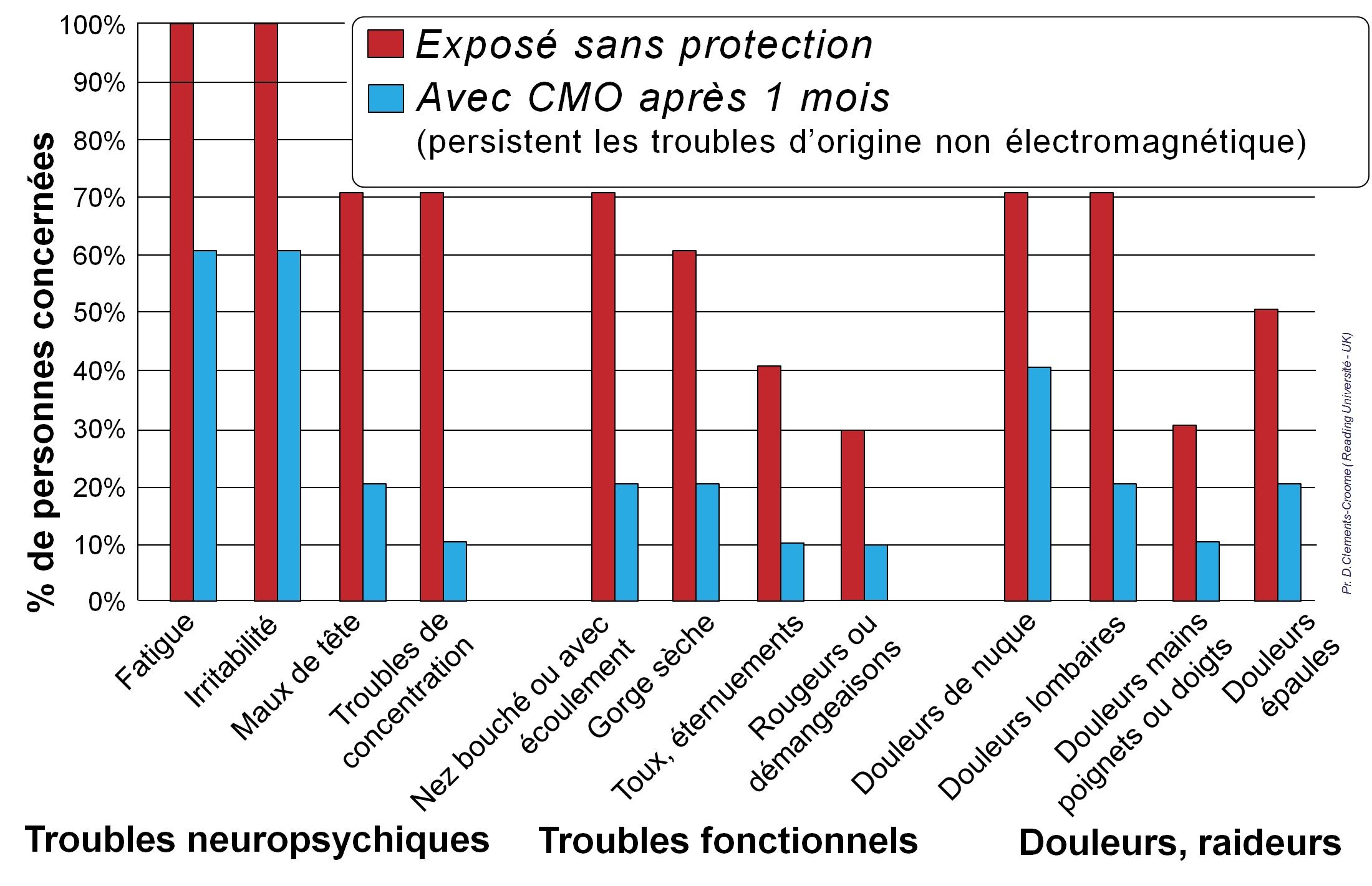
The symptoms of stress studied in the protocol of Prof. D. Clements-Cromme (Reading University-UK) “Building Sickness syndrome” (building syndrome) are usually related to ergonomic, environmental and general stress factors at work in Large office buildings. Chronic exposure to the radiation of GSM as to that of a computer screen causes quite substantially the same type of symptomatology in both cases, that of type Neuropsychic, the type Functional and the type Inflammatory (see list above).
The experiments are conducted in double blind and cross-groups, with or without CMO; Thus statistically 35 to 40% of the symptoms of stress encountered by doctors in these GSM and computer users could be related to chronic exposure to their radiations.
For memory and possible correlation with these clinical results, remember the inflammatory parameters in humans exposed, immune, hormonal and cellular studied in animals exposed to the same radiant devices, which showed Significant depressions or malfunctions of biological stress.
4-nitrogen monoxide (or nitric oxide, NO) : A marker of tissue inflammation
Nitric oxide (NO) present in exhalation is a marker of tissue inflammation, cellular suffering and biological stress. Its 40% increase after 15 days of using a GSM is a clear sign of non-biocompatibility of this instrument.
The CMO applied to GSM allows this return to normal and reflects the restoration of the biocompatibility of GSM when equipped with it.
|
Experimental Conditions |
Parameter studied |
Before protection |
After protection |
Authors |
|
Test duration = 15 days x 2 10 topics |
Exhaled nitric oxide Concentration (cell stress marker: n = 1.00 ppm) Standard value of the measurement: |
Measure 40% increase |
Measure Back to Normal |
E. Stepanov General Physics Institute |
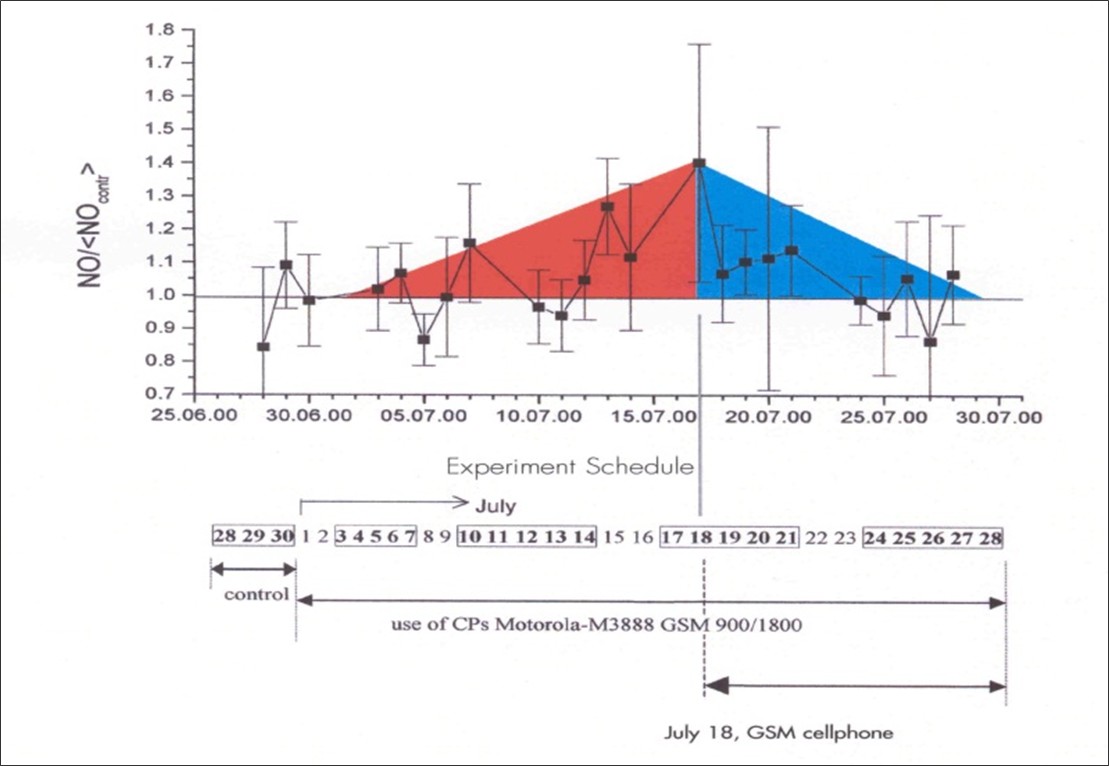
Nitric oxide NO is toxic to neurons and can lead to cell death
First step: 17 days of exposure, at a rate of 45min./day
Second stage: 18 days of exposure with CMO fixed on the GSM
5-Ophthalmology
The work of Prof. Miyata in humans and animals on the effects of electromagnetic fields on the eye and on the sight showed that the eye complaints and pathologies of screen users are linked to the electromagnetic fields of these devices. Tests on the animal with a black canvas covered screen (brightness, contrasts or strobe effect that cannot be taken into account) also indicate that screen filters, designed to improve visual comfort, do not render computer screens Biologically compatible with the eye and the sight.
Ulcerations of the cornea are observed after 4 hours of video games on a television screen. The installation of a CMO on the screen has a corrective effect on the measured ocular anomalies and symptoms: it protects ulcers from the cornea, decreases eye fatigue and increases the capacity of accommodation.
|
Experimental Conditions |
Parameter studied |
Before protection |
After protection |
Authors |
|
Test duration 4 hours Continuous |
-Corneal ulcerations -Accom-Modality time -Accomodation of the near point |
= 1400 = 0827 = 0083 |
= 700 = 0.69 =0.98 |
Prof. Miyata Kitasato University |
Source: http://www.cem-vivant.com/page-etudes-sur-l-homme,7.html
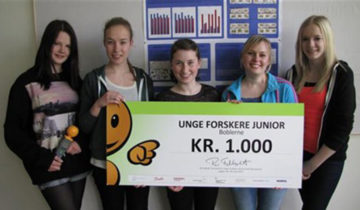
 No products in the cart.
No products in the cart. 
